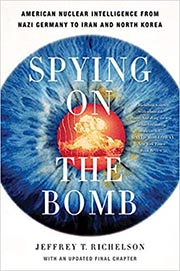Spying on the Bomb: American Nuclear Intelligence from Nazi Germany to Iran and North Korea
by Jeffrey T. Richelson
Reviewed November 30, 2007
 The development of nuclear weapons in the 20th century changed the world like no other scientific event. For more than 60 years, the United States has monitored friends and foes seeking to develop nuclear weapons. In the book, Spying on the Bomb: American Nuclear Intelligence from Nazi Germany to Iran and North Korea, author Jeffrey T. Richelson, has written a detailed and authoritative account of the U.S. nuclear intelligence efforts. Richelson is a senior fellow at the National Security Archive and author of several books on American intelligence.
The development of nuclear weapons in the 20th century changed the world like no other scientific event. For more than 60 years, the United States has monitored friends and foes seeking to develop nuclear weapons. In the book, Spying on the Bomb: American Nuclear Intelligence from Nazi Germany to Iran and North Korea, author Jeffrey T. Richelson, has written a detailed and authoritative account of the U.S. nuclear intelligence efforts. Richelson is a senior fellow at the National Security Archive and author of several books on American intelligence.
This book explores both the successes and failures--from the early days of World War II to the present day. Richelson examines the nuclear projects of Nazi Germany, the Soviet Union, China, France, Israel, India, South Africa, Taiwan, Libya, Pakistan, Iran and North Korea, as well as Iraq. Each chapter chronologically focuses on the nuclear activities of one or more countries, intermingling what the United States believed was happening, with accounts of what actually occurred in each country's laboratories, test sites, and decision-making leadership. He draws heavily from recently declassified documents and interviews with scientists and spies involved in nuclear espionage.
Every nation that moved to join the nuclear club presented new problems for U.S. intelligence gathering. The book examines the work of the CIA and other intelligence agencies in identifying and providing the details about those nuclear programs as well as the agencies' efforts to monitor and evaluate nuclear testing. The book also highlights the methods used to detect nuclear tests including long-range aircraft mounted with filters to catch radioactive debris, a network of stations to measure seismic waves and early satellites that would eject film capsules to be caught mid-air by planes.
Of great interest is examining the failures by the intelligence community, such as the failure to detect Indian preparations for tests in May 1998. By far, the most serious failure of all was in Iraq in 2003, because in no other case did the intelligence assessments serve as justification for the use of military force. The book also examines the double flash detected by the Vela satellite over South Africa in 1979. Since it wasn't the South Africans (they weren't ready to test), was it an Israeli device or an equipment malfunction?
The 700-page book contains new information, photographs, maps, reference notes, a good index, and is well written. Although dense, it is perfect for wonks like me.
Available at amazon.com.